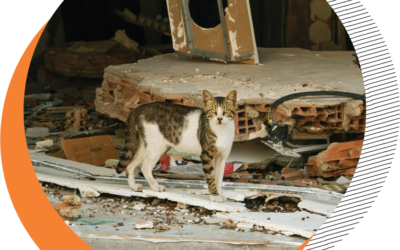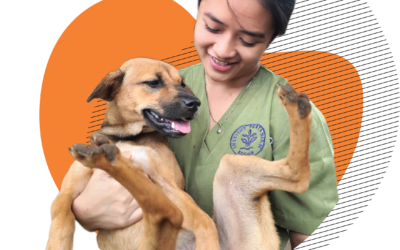
World Zoonoses Day July 6, Awareness Must Be Raised
By: Maryam Smeer
Translator : AWI Team
Zoonoses are increasingly discussed. In fact, every July 6 is celebrated World Zoonoses Day.
For your information, zoonosis is a disease that can be transmitted from animals to humans or vice versa.
The transmission process of zoonosis is when microorganisms move from animals to humans or vice versa. These microorganisms can be bacteria, viruses, fungi, and parasites such as protozoa and worms.
Image 1. JAAN Domestic Shelter

Transmission can be done in 3 ways, such as:
1. Direct contact
Zoonotic diseases can be transmitted through direct contact with infected animals. For example, being bitten, exposed to animal saliva or body fluids, or animal feces.
2. Indirect contact
Zoonotic diseases can also be transmitted through indirect contact. This means that the contact occurs through intermediary media. Examples of media are other animals, water and land. Animals that are usually the medium of transmission are types of arthropods such as mosquitoes, fleas, flies, etc.
Image 2. JAAN Domestic Shelter

3. Consumption
Zoonoses can potentially spread through the consumption of animals harboring disease-causing microorganisms. When someone eats or drinks something dangerous, the risk increases. For instance, raw milk without pasteurization, undercooked meat, or eggs. In addition, eating fruits and vegetables tainted with disease-ridden animal excrement carries some risk
60% of newly reported infectious illnesses worldwide, according to WHO, are zoonotic. Since transmission is quite simple, be aware of how to prevent it. Some actions that can be taken to lessen the possibility of zoonotic transmission include the following:
1. Keep your hands clean by washing your hands frequently. Even if you don’t touch animals whatever, we should wash our hands properly. and diligent. If there is no water and soap, then a disinfectant containing alcohol can be used. At least this disinfectant contains a minimum of 60% alcohol.
2. Keep the animal’s environment clean. We need to pay attention to the cleanliness of animal waste, food and drink. Immediately cleaning dirt and food and drink containers is one of the best efforts.
3. Avoid mosquito and tick bites.
4. Avoid animal bites and scratches.
Numerous psychological, social, and health advantages can come from owning a pet. Pets, however, can spread zoonotic infections if this is not coupled with proper hygiene.
Thus, be mindful of the animals’ needs for hygiene while also providing for them.
Source:
Related Post :
Having a Pet is Good for a Child’s Growth
By: Maryam Smeer Translator : AWI TeamWho would have thought that petting animals is not only fun, but it also provides many benefits to children's growth and development.Here are some of the benefits that children get when interacting with pets:1. Developing...
Healthy Pets, Happy Families: Tips for Taking Care of Pets in the Transitional Season
By: Arditya Laksono - Freelance English Tutor The transitional season, or the period between seasons, often brings extreme and erratic weather changes. The scorching heat of the day can suddenly change in a matter of hours to heavy rain with thunder in the...
Bringing Butterflies into Your Yard
By: Putu Eka Gunadi It's been said that you shouldn't chase after butterflies if you want to capture them. That made it hard to capture since the harder one tried to catch it, the farther it would fly. If you make yourself chase after it rather than obtaining it....
More Than Just War Victims: Those Rarely Spotlighted by the Mass Media
By : Arditya LaksonoFreelance English Tutor Translator : AWI TeamThe sound of bullets whistling and bomb explosions shook the ground. Black smoke and thick dust from buildings destroyed by bombs rose in the sky. Residents and animals in the area were frightened and...
HOW TO IDENTIFY CRUELTY TO ANIMALS
By: FOUR PAWS International FOUR PAWS explains what you need to look for to recognize the signs of a potential cruelty situation. Cruelty to animals can take many different forms. These range from suffering caused by the way a pet is kept to acts of violence such as...
BETTER TO ADOPT
Content By : Karin Franken,Co-Founder & Board Director JAAN Domestic Ilustration by : Aya Diandara SalvatorYou will help to reduce dog meat trade and illegal dog meat farmDogs meat trade and illegal farming usually don’t apply 5 animal welfare principles. For...





